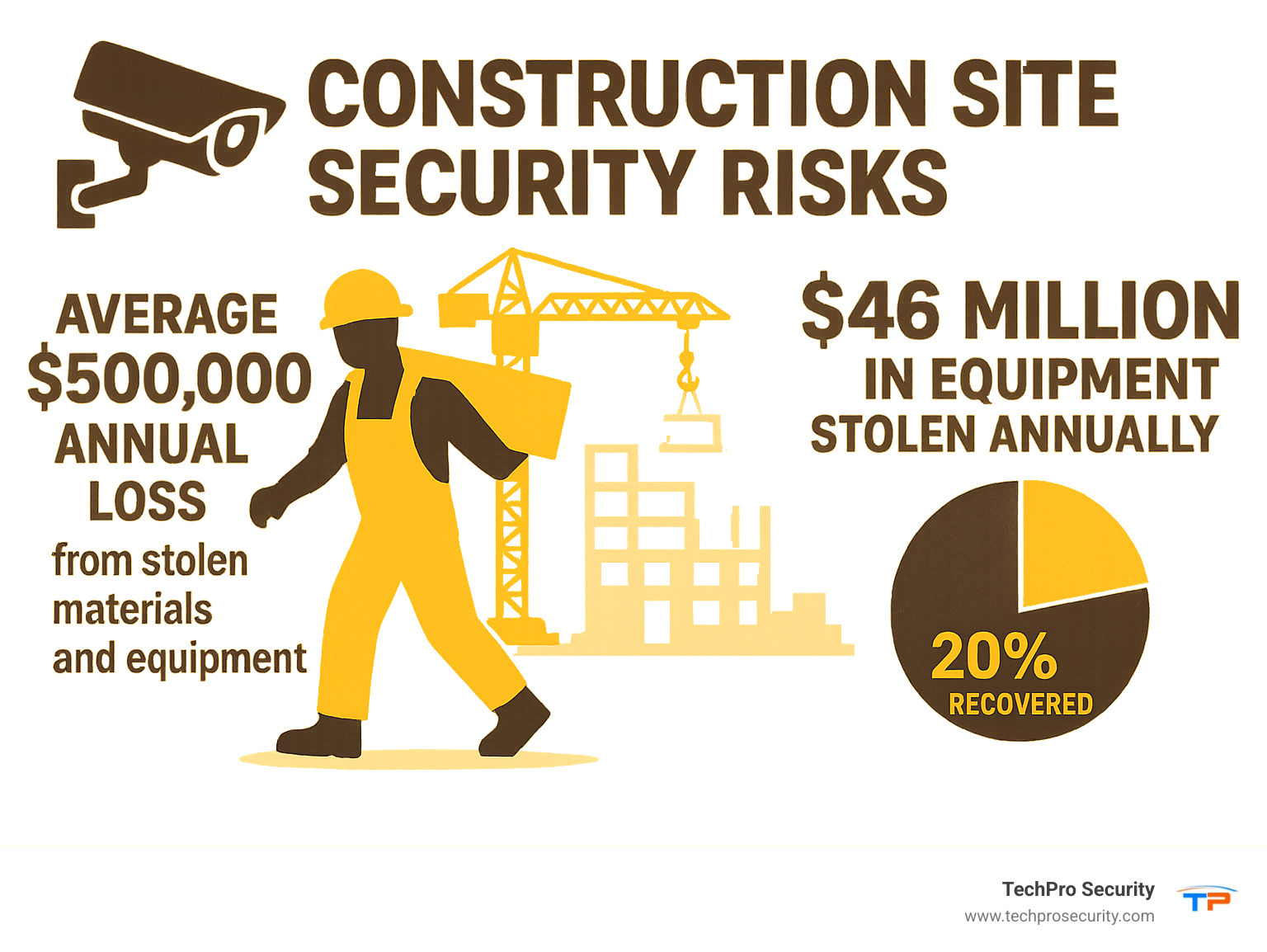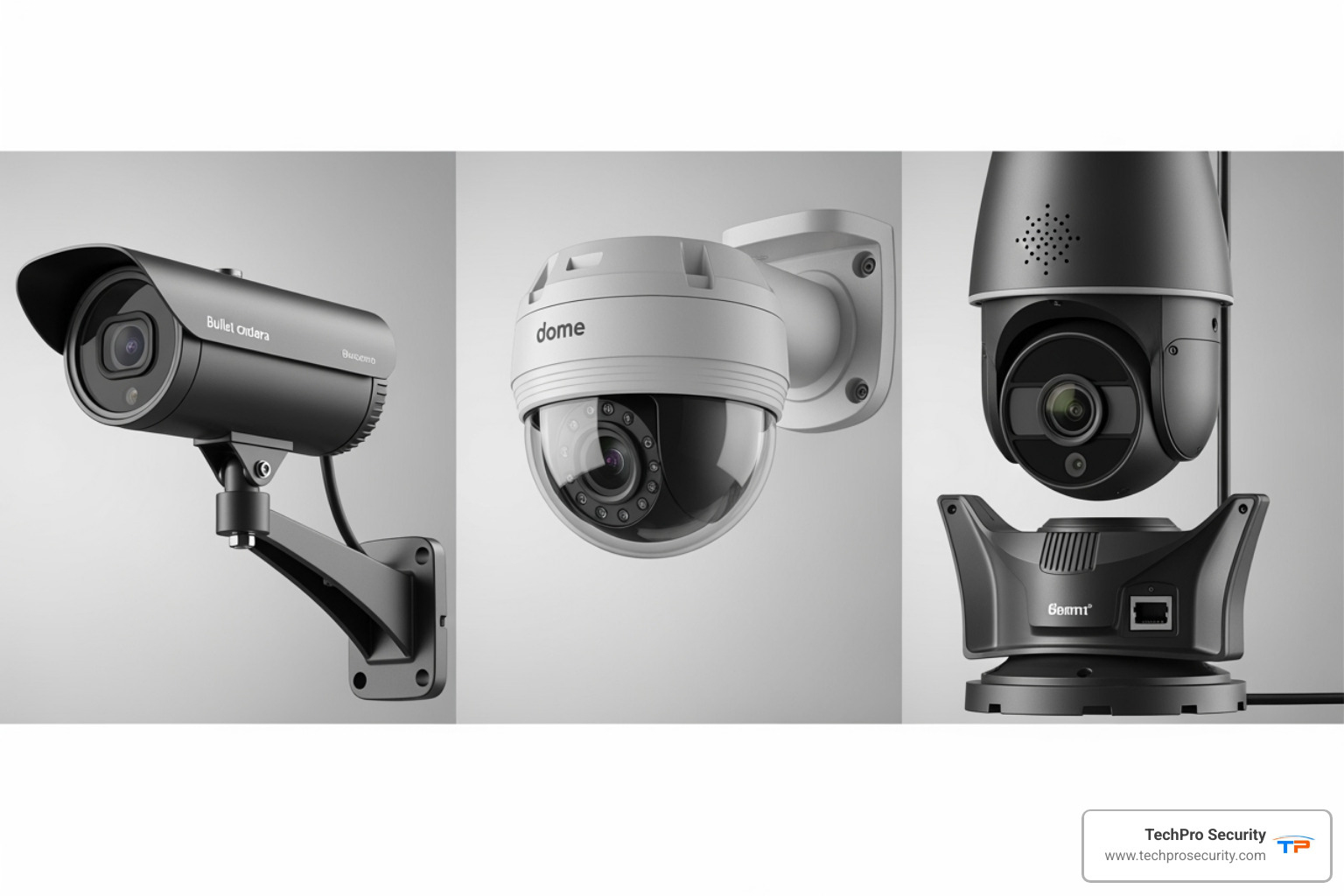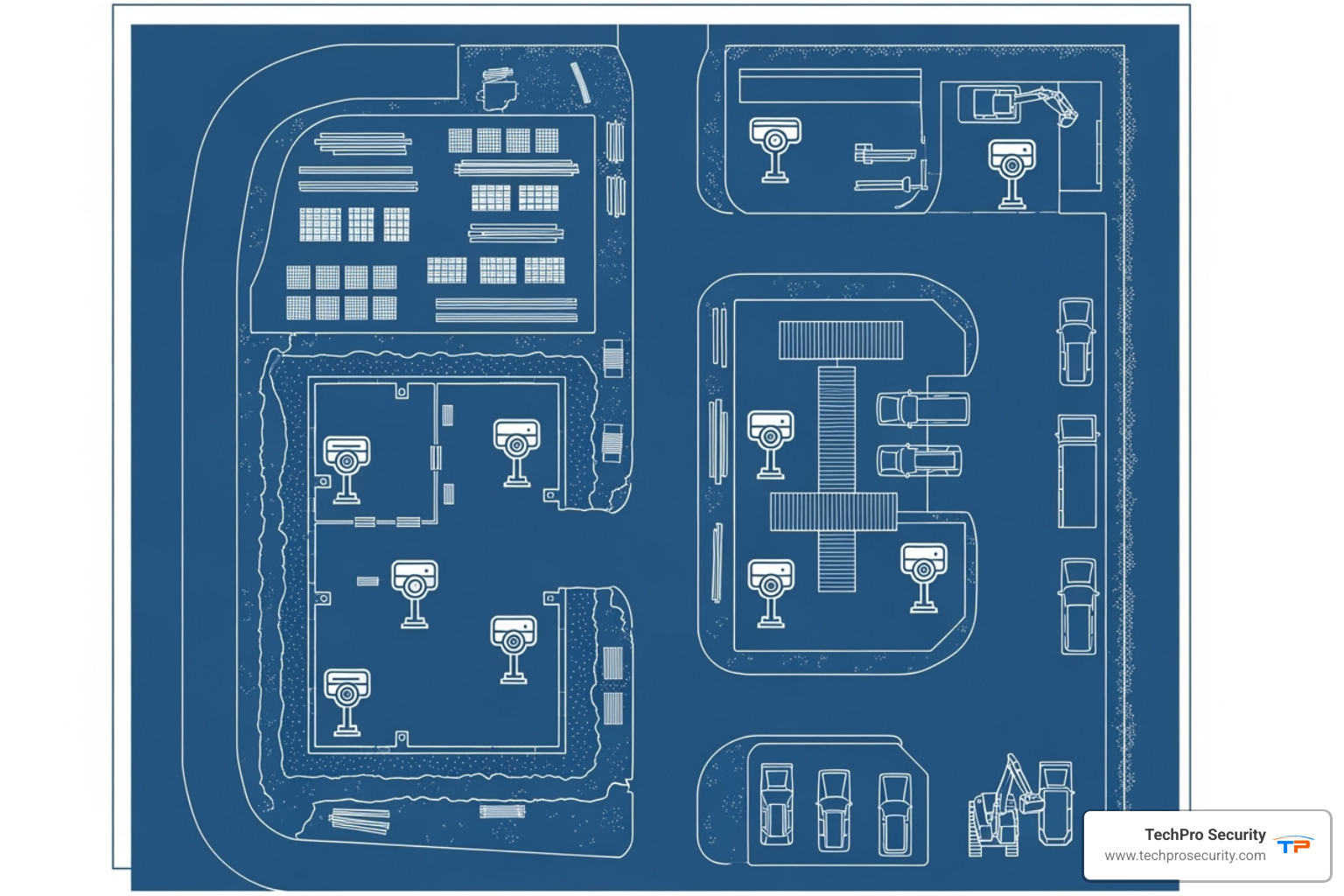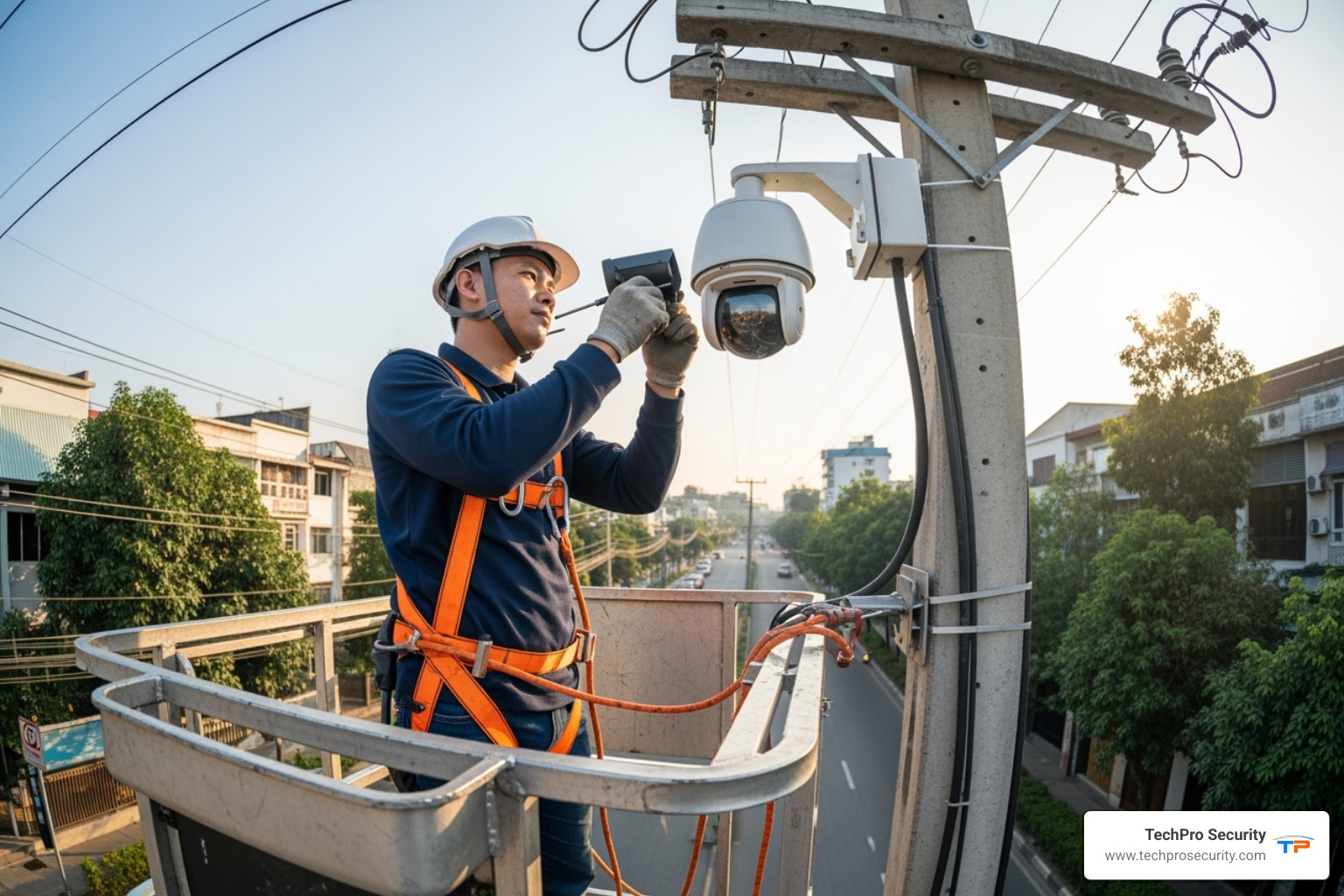How to secure a construction site with cctv cameras #1

How to secure a construction site with cctv cameras #1
Securing Your Jobsite: An Introduction to CCTV
If you’re looking for information on how to secure a construction site with cctv cameras, you’re in the right place. CCTV systems are essential for deterring theft, monitoring your site 24/7, collecting evidence, and boosting safety.
Imagine arriving at your site to find materials missing or equipment damaged. Construction sites are prime targets due to their open nature and valuable assets. Annually, sites can lose an average of $500,000 in materials and equipment, with roughly $46 million in equipment stolen and only a fraction recovered.
These losses lead to project delays, safety risks, and reputational damage. A secure site is vital for success. Modern CCTV systems are powerful tools that deter crime, improve safety, and streamline project management.
I’m Brad Besner, founder of Techpro Security Products. With years of experience in perimeter protection, I’m an expert in how to secure a construction site with cctv cameras. My goal is to help you protect your investment and ensure peace of mind.

Understanding the Stakes: Why Your Construction Site is a Target
Construction sites are like open-air treasure chests, making them prime targets for theft and vandalism. Understanding how to secure a construction site with cctv cameras is essential, not just a good idea.
Installing CCTV is a proactive step to deter theft, prevent vandalism, improve worker safety, and provide liability protection. With clear evidence collection, remote project monitoring, and improved employee accountability, these systems can even lead to insurance cost reductions. Our video monitoring services add another layer of protection, keeping your site safe around the clock. For a quick primer on how CCTV works and its common components, see Closed-circuit television.
The High Cost of Insecurity
Poor security has a huge financial impact. Construction sites lose between $300 million to $1 billion annually to theft and vandalism. With about $46 million in equipment stolen each year and little recovered, the consequences are severe.
- Theft of Materials & Equipment: Losing copper, lumber, or heavy machinery costs money and causes major project delays and missed deadlines.
- Vandalism & Unauthorized Access: Vandalism leads to expensive repairs, while trespassers can steal, cause damage, or create safety hazards, posing a public safety risk.
These issues shrink profits, raise insurance premiums, and damage your company’s reputation.
More Than Just Security: Enhancing Safety and Productivity
CCTV systems are powerful tools for improving site operations.
- Safety and Accountability: Monitor job sites in real-time to enforce safety protocols and PPE usage, helping prevent accidents. When workers know they are monitored, accountability and safe practices often improve. Our commercial security camera installation services focus on strategic placement for safety monitoring.
- Investigations and Claims: In case of an accident or dispute, video footage provides an unbiased record. This is invaluable for investigations, understanding root causes, and defending against false liability claims.
- Project & Inventory Management: Track project progress remotely to ensure you’re on schedule. You can also verify material deliveries, ensure proper storage, and maintain accurate inventory, preventing supplies from “walking off” the site.
Choosing Your Eyes in the Sky: Selecting the Right CCTV System
When figuring out how to secure a construction site with cctv cameras, choosing the right system is critical. Every site is unique, so a one-size-fits-all approach doesn’t work. We assess your specific needs to recommend the best equipment.

Common camera types include bullet cameras for monitoring specific areas, tamper-resistant dome cameras, and PTZ (pan-tilt-zoom) cameras that cover large areas and can follow activity.
Key Features to Look for When Deciding how to secure a construction site with cctv cameras
Your cameras must be tough enough for a construction environment. Look for these essential features:
- Durability and Weatherproofing: Cameras need to withstand dust, rain, and debris. Look for high IP ratings (like IP67) to ensure they are built to last. Our commercial security camera installation prioritizes durable hardware.
- High-Resolution Video: You need clear footage (1080p minimum, 4K is ideal) to identify faces, read license plates, and provide usable evidence.
- Advanced Night Vision: Since most theft occurs at night, cameras with Infrared (IR) or starlight technology are crucial for seeing in complete darkness.
- Motion Detection & AI Analytics: Smart cameras can distinguish between humans, vehicles, and animals, reducing false alarms and sending more actionable alerts.
- Remote Monitoring & Mobile Access: Stay connected to your site 24/7 from your phone for quick response to any incidents.
- Cloud-Based Storage: Our cloud video surveillance protects your footage from on-site damage or theft, with local backups for redundancy.
- Tamper Resistance: Vandal-resistant housings and secure mounting prevent criminals from disabling your cameras.
Powering Your Surveillance: Wired, Wireless, and Solar Options
Powering cameras on a construction site can be a challenge, but there are solutions for every scenario.
Feature Wired CCTV Systems Wireless CCTV Systems Solar-Powered CCTV Systems
Reliability Highly reliable, stable connection, consistent power Can be affected by signal interference, battery life issues Highly reliable when properly sized, relies on sunlight
Flexibility Less flexible, fixed installation, requires cabling Highly flexible, easy to relocate, quick setup Very flexible, completely self-contained, rapid deployment
Installation More complex, requires trenching/conduit for cables Easier, less invasive, but still needs power source Simple, quick, ideal for remote or temporary sites
Cost Higher initial installation cost due to cabling Lower initial installation, ongoing battery/charging costs Higher initial cost for solar panels/batteries, low running cost
Wired systems offer the most reliable connection when stable power is available. Power over Ethernet (PoE) simplifies this by running power and data through one cable.
Wireless systems provide flexibility for temporary setups or changing layouts, though they still require a power source like batteries or an electrical hookup.
Solar-powered systems are ideal for remote sites without grid access. These self-contained units work anywhere there’s sun.
Often, a hybrid solution is best, combining wired, wireless, and solar cameras to match the specific needs of different areas on your site.
Strategic Surveillance: How to Secure a Construction Site with CCTV Cameras
Strategic camera placement is the key to effective surveillance. Simply installing cameras isn’t enough; the art of how to secure a construction site with cctv cameras is about creating a network that covers all vulnerabilities.

We begin with a thorough site assessment and risk analysis, looking at your site like a potential intruder would. Our goal is to minimize blind spots and maximize coverage of critical areas by identifying high-value targets and potential entry points.
Step-by-Step Guide on how to secure a construction site with cctv cameras
Our placement strategy creates a comprehensive security blanket for your site:
- Entry and Exit Points: Every gate and pathway needs a camera positioned to capture clear facial and license plate details.
- Perimeter Monitoring: We use overlapping camera fields of view along fence lines to create a virtual barrier against intruders.
- Material Storage Areas: High-value materials like copper and lumber require dedicated 24/7 surveillance.
- Heavy Equipment and Parking: PTZ cameras are ideal for monitoring these areas, especially after hours, as they can pan, tilt, and zoom to track activity.
- Site Offices and Trailers: We cover all access points to protect sensitive documents, electronics, and tools.
- High-Traffic Work Areas: Cameras here monitor for security, safety compliance, and project progress.
The Role of Lighting and Camera Angles
Proper lighting and camera angles are crucial for clear footage.
We position cameras to avoid sun glare and minimize shadows. Supplemental lighting, like motion-activated floodlights, dramatically improves night surveillance and acts as a powerful deterrent. We also ensure clear lines of sight, accounting for changes as the project evolves, and select the optimal mounting height to balance wide coverage with capturing necessary detail.
For areas with no light or poor weather, thermal security cameras are invaluable. They detect heat signatures, spotting intruders in complete darkness, fog, or smoke.
Beyond Installation: Maintenance, Integration, and Legal Compliance
Installing a CCTV system is just the beginning of how to secure a construction site with cctv cameras. Ongoing care is needed to protect your investment.

Regular maintenance is crucial. This includes cleaning dusty lenses, checking cable connections, performing software updates for security patches, and ensuring your data storage plan is solid. Whether using local or cloud-based storage solutions, you need a clear plan for footage retention and an incident response plan to know how to act when an event occurs.
Integrating CCTV with a Total Security Ecosystem
Your CCTV system is most powerful when integrated with other security measures to create a complete ecosystem.
- Access control systems paired with cameras provide a video record of who enters, where, and when.
- Security alarms can trigger cameras to focus on a specific area when a sensor is tripped.
- Motion-activated lighting deters intruders and provides illumination for clear video.
- Audio deterrence with two-way talk allows you to verbally warn off trespassers in real-time.
- Perimeter security combined with professional alarm monitoring ensures rapid response to verified threats.
Legal and Privacy Considerations
Staying legally compliant is simple but important. Construction sites have fewer privacy concerns than other spaces, but some rules apply.
Always post clear signage stating the area is under video surveillance. This serves as both a legal requirement and a deterrent. Inform employees they are being recorded for safety and security purposes. Use common sense and avoid placing cameras in areas with a reasonable expectation of privacy, like break areas.
Finally, follow data protection laws by storing footage securely, limiting access, and having clear retention policies. Properly managed CCTV footage is crucial evidence for insurance claims and legal disputes. At TechPro Security, we help South Florida construction companies steer these requirements.
Frequently Asked Questions about Construction Site CCTV
How many cameras are needed for a typical construction site?
The number of cameras needed to secure a construction site with cctv cameras depends on the site’s size and vulnerabilities. A small project may need a few, while a large one could require dozens. The goal is not to count cameras but to cover critical areas: all entry/exit points, material storage, and equipment parking zones. A professional site assessment will determine the optimal layout to eliminate blind spots in high-value areas.
Can CCTV cameras operate without internet on a construction site?
Yes. Many sites lack reliable internet, so we design systems for these conditions. Cameras can record to on-site NVRs or DVRs for local storage, accessible without an internet connection. For remote access, we use cameras with built-in 4G or 5G LTE modems. These use cellular networks to transmit data, allowing you to view live feeds and receive alerts on your phone from anywhere.
What is the difference between active monitoring and just recording?
This is the difference between being reactive and proactive.
Recording simply captures footage for later review. It provides evidence after a theft or vandalism has already occurred.
Active monitoring, like our video monitoring, involves trained professionals watching your feeds live. When they spot suspicious activity, they can intervene immediately using two-way audio to warn off intruders or by dispatching authorities. This approach prevents crime rather than just documenting it, leading to fewer losses.
Conclusion
We’ve explored how to secure a construction site with cctv cameras, revealing it’s a comprehensive approach to protecting your investment, workers, and peace of mind.
Modern CCTV systems are versatile guardians. They deter crime, monitor safety, provide evidence, and track project progress. Choosing the right features—like high-resolution video, weatherproofing, night vision, and AI analytics—is an investment in a total security solution. Strategic placement and integration with access control, alarms, and professional monitoring create a powerful security ecosystem that works 24/7.
The shift from reactive to proactive security is key. It prevents problems before they cost you time and money, leading to reduced losses, fewer delays, better safety records, and lower insurance premiums. These tangible benefits protect your bottom line and reputation.
Here in South Florida, TechPro Security understands the unique challenges construction sites face, from weather to diverse project needs across Miami-Dade and Palm Beach County. Our experienced team partners with you to design a system for your specific project, backed by extensive warranties and free US-based support.
Your project is a significant investment. Don’t leave its security to chance. Contact us for a professional commercial security camera installation to keep your site secure from groundbreaking to grand opening.